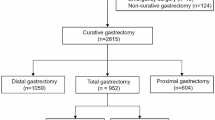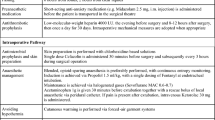Abstract
Background
Enhanced recovery after surgery (ERAS) programs have gained widespread acceptance in different fields of major surgery. However, most elements of perioperative care in ERAS are based on practices that originated from colorectal surgery. This study investigated compliance with the main elements of ERAS for patients undergoing gastrectomy for gastric carcinoma.
Methods
This phase 2 study enrolled 168 patients undergoing elective gastrectomy for gastric carcinoma. An ERAS program consisting of 18 main elements was implemented, and compliance with each element was evaluated (ClinicalTrials.gov, NCT01653496).
Results
Distal gastrectomy was performed for 142 patients (84.5%) and total gastrectomy for 26 patients (10.1%). Laparoscopic surgery was performed for 141 patients (86%). The postoperative morbidity rate was 9.5%, and the mortality rate was 0%. The rates of compliance with the 18 main elements of ERAS ranged from 88.1 to 100%. The lowest compliance rate was observed in the restriction of intravenous fluid element (88.1%). Overall, all ERAS elements were successfully applied for 122 patients (72.6%). In the multivariate analysis, the significant factors that adversely affected compliance with ERAS were surgery during the early study period [odds ratio (OR) 0.39; p = 0.038], open surgery (OR 0.15; p <0.001), and postoperative morbidity (OR 0.16; p = 0.003).
Conclusions
Most elements of ERAS can be successfully applied for patients undergoing gastrectomy for gastric carcinoma. Multimodal collaboration between providers is essential to achieve proper application of ERAS.

Similar content being viewed by others
References
Kehlet H, Wilmore DW. Multimodal strategies to improve surgical outcome. Am J Surg. 2002;183:630–641.
Wind J, Polle SW, Fung KonJin PH, et al. Systematic review of enhanced recovery programmes in colonic surgery. Br J Surg. 2006;93:800–809.
Kim HH, Hyung WJ, Cho GS, et al. Morbidity and mortality of laparoscopic gastrectomy versus open gastrectomy for gastric cancer: an interim report: a phase 3 multicenter, prospective, randomized trial (KLASS Trial). Ann Surg. 2010;251:417–420.
Sasako M, Sano T, Yamamoto S, et al. D2 Lymphadenectomy alone or with paraaortic nodal dissection for gastric cancer. N Engl J Med. 2008;359:453–462.
Degiuli M, Sasako M, Ponti A, et al. Randomized clinical trial comparing survival after D1 or D2 gastrectomy for gastric cancer. Br J Surg. 2014;101:23–31.
Japanese Gastric Cancer Association. Japanese Gastric Cancer Treatment Guidelines 2010 (ver. 3). Gastric Cancer. 2011;14:113–123.
Ahn HS, Yook JH, Park CH, et al. General perioperative management of gastric cancer patients at high-volume centers. Gastric Cancer. 2011;14:178–182.
Chen Hu J, Xin Jiang L, Cai L, et al. Preliminary experience of fast-track surgery combined with laparoscopy-assisted radical distal gastrectomy for gastric cancer. J Gastrointest Surg. 2012;16:1830–1839.
Kim JW, Kim WS, Cheong JH, Hyung WJ, Choi SH, Noh SH. Safety and efficacy of fast-track surgery in laparoscopic distal gastrectomy for gastric cancer: a randomized clinical trial. World J Surg. 2012;36:2879–2887.
Yamada T, Hayashi T, Cho H, Yoshikawa T, Taniguchi H, Fukushima R, Tsuburaya A. Usefulness of enhanced recovery after surgery protocol as compared with conventional perioperative care in gastric surgery. Gastric Cancer. 2012;15:34–41.
Vlug MS, Wind J, Hollmann MW, et al. Laparoscopy in combination with fast-track multimodal management is the best perioperative strategy in patients undergoing colonic surgery: a randomized clinical trial (LAFA-study). Ann Surg. 2011;254:868–875.
Gustafsson UO, Hausel J, Thorell A, Liunggist O, Sooop M, Nygren J; Enhanced Recovery After Surgery Study Group. Adherence to the enhanced recovery after surgery protocol and outcomes after colorectal cancer surgery. Arch Surg. 2011;146:571–577.
Gustafsson UO, Scott MJ, Schwenk W, et al. Guidelines for perioperative care in elective colonic surgery: Enhanced Recovery After Surgery (ERASR) Society Recommendations. Clin Nutr. 2012;31:783–800.
Vlug MS, Bartels SA, Wind J, Ubbink DT, Hollmann MW, Bemelman WA; Collaborative LAFA Study Group. Which fast-track elements predict early recovery after colon cancer surgery? Colorectal Dis. 2012;14:1001–1008.
Smart NJ, White P, Allison AS, Ockrim JB, Kennedy RH, Francis NK. Deviation and failure of enhanced recovery after surgery following laparoscopic colorectal surgery: early prediction model. Colorectal Dis. 2012;14:e727–e734.
Spanjersberg WR, Reurings J, Keus F, van Laarhoven CJ. Fast-tract surgery versus conventional recovery strategies for colorectal surgery. Cochrane Database Sys Rev. 2011;16:CD007635.
Wang D, Kong Y, Zhong B, Zhou X, Zhou Y. Fast-track surgery improves postoperative recovery in patients with gastric cancer: a randomized comparison with conventional postoperative care. J Gastrointest Surg. 2010;14:620–627.
Jeong O, Ryu SY, Park YK, Kim YJ. The effect of low-molecular-weight heparin thromboprophylaxis on bleeding complications after gastric cancer surgery. Ann Surg Oncol. 2010;17:2363–2369.
Liew NC, Moissinac K, Gul Y. Postoperative venous thromoboembolism in Asia: a critical appraisal of its incidence. Asian J Surg. 2003;26:154–158.
Breivik H, Bang U, Jalonen J, Viqfusson G, Alahuhta S, Lagerkranser M. Nordic guidelines for neuraxial blocks in disturbed haemostasis from the Scandinavian Society of Anaesthesiology and Intensive Care Medicine. Acta Anaesthesiol Scand. 2010;54:16–41.
Lassen K, Kjaeve J, Fetveit T, Tranø G, Sigurdsson HK, Horn A, Revhaug A. Allowing normal food at will after major upper gastrointestinal surgery does not increase morbidity: a randomized multicenter trial. Am Surg. 2008;247:721–729.
Jeong O, Ryu SY, Jung MR, Choi WW, Park YK. The safety and feasibility of early postoperative oral nutrition on the first postoperative day after gastrectomy for gastric carcinoma. Gastric Cancer. 2013;17:324–331.
Sylla P, Kirman I, Whelan RL. Immunological advantages of advanced laparoscopy. Surg Clin North Am. 2005;85:1–18, vii.
Persiani R, Antonacci V, Biondi A, et al. Determinants of surgical morbidity in gastric cancer treatment. J Am Coll Surg. 2008;207:13–19.
Adamina M, Kehlet H, Tomlinson GA, Senagore AJ, Delaney CP. Enhanced recovery pathways optimize health outcomes and resource utilization: a meta-analysis of randomized controlled trials in colorectal surgery. Surgery. 2011;149:830–840.
Kassin MT, Owen RM, Perez SD, et al. Risk factors for 30-day hospital readmission among general surgery patients. J Am Coll Surg. 2012;215:322–330.
Kim MC, Kim KH, Jung GJ. A 5-year analysis of readmissions after radical subtotal gastrectomy for early gastric cancer. Ann Surg Oncol. 2012;19:2459–2464.
Author information
Authors and Affiliations
Corresponding author
Ethics declarations
Disclosure
All authors declare that there are no conflicts of interest.
Rights and permissions
About this article
Cite this article
Jung, M.R., Ryu, S.Y., Park, Y.K. et al. Compliance with an Enhanced Recovery After a Surgery Program for Patients Undergoing Gastrectomy for Gastric Carcinoma: A Phase 2 Study. Ann Surg Oncol 25, 2366–2373 (2018). https://doi.org/10.1245/s10434-018-6524-4
Received:
Published:
Issue Date:
DOI: https://doi.org/10.1245/s10434-018-6524-4




